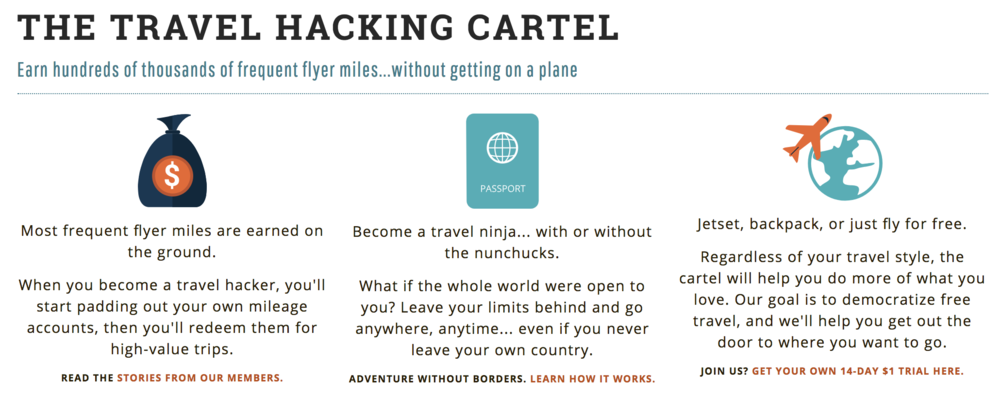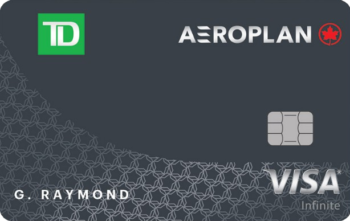In this post, I’m going to comment on a major pet peeve of mine, which probably doesn’t bother anyone else and is almost certainly inconsequential in the grand scheme of things. But hey, this is, after all, a blog, where pontificating about ultimately inconsequential things is my bread and butter. So let’s get started, shall we?
Specifically, I’m talking about the term “travel hacking” being used to refer to the practice of travelling the world using Miles & Points. In short, I think it’s a terrible descriptor of our hobby and can’t help but wish that people would stop saying it.
What’s the Origin of “Travel Hacking”?
As far as I can tell, “travel hacking” was coined by Chris Guillebeau, a popular travel blogger and online business guru who’s perhaps best known for publishing self-help books and visiting every country in the world by his 35th birthday. One of Chris’s projects was launching the so-called Travel Hacking Cartel, a subscription-based service that would provide members with tips on how to travel the world using Miles & Points.
Like many similar services out there, the Travel Hacking Cartel would charge you money for the privilege of having bits and pieces of information – which credit cards to get, which award redemptions to make, etc. – delivered to your inbox, even though all this information could’ve been obtained from doing your own research and networking with others. (Not that there’s anything wrong with this business model, given the success Chris and many others have had with it.)

Anyway, the term “travel hacking” seems to have spread from there, most likely because it was a catchy enough buzzphrase that managed to capture the attention of the masses from time to time. As its usage spread, it seems to be mainly used in content targeted towards beginners in the hobby, again as a buzzphrase that seeks to draw them into the game. “Want to see the world, but don’t want to pay full price? Try travel hacking!” That sort of stuff.
Why I Don’t Like It
The problem with “travel hacking” is obvious. “Hacking” is used to describe gaining unauthorized access into computer systems, and conjures up images of hooded figures typing away in a dark basement. It connotes shadiness at best and illegitimacy at worst, none of which are traits associated with award travel in reality.

Like any other worthwhile pursuit, travelling on points requires research, effort, and time, but what it doesn’t require is acting surreptitiously or breaking the law. When you break it down, maximizing credit card rewards is ultimately a perfectly normal consumer behaviour, and doing some simple math shows us that the way to maximize those rewards happens to be to redeem your rewards for travel.
We all play this game in different ways. Some of us are enthusiastic about luxury travel, others use points to treat themselves and their loved ones to unforgettable trips together, and still others like to use points to unlock parts of the world that would be prohibitively expensive otherwise. None of us are up to no good – there’s nothing about it that’s inherently underhanded or illegitimate, and it would be in the best interest of everyone in the community to distance themselves from using language that serves to reinforce such a notion.
There’s an argument that “hacking” has recently also come to mean a clever yet uncommon way to do something (as in “life hacks”). Still, I don’t think this usage is widespread enough to replace the original meaning with its negative connotations. Even granting this, I think that while travelling on points is still a relatively niche phenomenon, there’s enough of us out there to form a very sizeable community, based on recent meetup and conference attendances. We ought to be helping to foster this community by portraying the hobby as more normal and legitimate, not less.
But It’s Just a Name!
Yes, and names are important, as they guide people’s impressions of what we do.
When uninitiated folks ask me how I travel so much, or what my website is about, I usually tell them “it’s all about travelling on points”. Most people have heard a little bit about the subject here and there throughout their daily life, and so the conversation naturally flows onto how this is all possible, how the game should be played responsibly, etc.
On the other hand, I simply can’t imagine saying “it’s all about travel hacking” or “I’m a travel hacker” or “I travel hack” to someone I respect and expecting to be taken seriously.
These wonderful opportunities we have at our fingertips often seem too good to be true at first glance, and that can already induce a natural skepticism in potential new participants. It’s my thinking that framing this pursuit as something incredible, exciting, and full of possibilities (which I can say from experience is absolutely true) is far superior to using a term like “travel hacking” and, whether intentionally or not, portraying it as clandestine, scheme-like, or otherwise some kind of big secret, which only serves to discourage newbies from getting in the game.
Ultimately, I think my issue with “travel hacking” boils down to the fact that while it’s a cheap attention-grabbing moniker and therefore makes for a good buzzphrase, its negative connotations probably results in driving away more people from learning about the magic of Miles & Points than it attracts. I don’t know about you guys, but the unforgettable trips I’ve taken and the amazing memories I’ve made thanks to Miles & Points are a source of immense joy for me, and I do feel the obligation to “spread the love” as much as possible so that many others can derive the same enjoyment from seeing the world in style for cheap. It’s one of the main reasons I write this blog, after all.
Conclusion
This post is the only time you’ll ever hear me say “travel hacking”. For me, it’s always “Miles & Points” or “travelling on points”. I do think the usage is dying out a little, though, especially seeing as all the leading voices in these circles need to stay far, far away from being associated with “hacking” of any kind, in order to satisfy their commercial partners (see how the popular blog Hack My Trip rebranded itself as Travel Codex not too long ago, for this very reason).
I’ve shared my opinion – what’s yours? Do you call yourself a “travel hacker”? I’d love to know what the wider community thinks on this one, so give me your input in the comments below.




















I agree with this not just for travel, but for everything else as well. I know I sound like an old man, but everything now is all about ‘hacks’. For me, I dislike it immensely because it feels cheap and unoriginal at this point. ‘Want to spice a headline or a hobby up? just add HACKS to it!’
Actually hacking in the programming industry is not a pejorative term. It wasn’t in the beginning either. Conferences have hack-a-thons and Facebook refers its developers as hackers. Usually refers to problem solvers.
Oh and Coders is too generic a term.
It’s unfortunate that hacking became synonymous with “malicious cracking” but we’re seeing some progress with things like life hacks.
I fully recognize that and everyone who’s accustomed to using the word “hacking” in its original positive sense has been quick to point that out. It’s unfortunate that its mainstream usage has come to mean something negative, but that’s sadly the way it is.
I don’t agree with this. Ever heard of lifehacker? Ikea hackers?
You are just reenforcing a stereotype.
Yep – like I said in the article:
There’s an argument that “hacking” has recently also come to mean a clever yet uncommon way to do something (as in “life hacks”). Still, I don’t think this usage is widespread enough to replace the original meaning with its negative connotations.
At the end of the day, this is simply how I feel about the matter, and I can’t stop people from saying what they want. I just think that we as a community would be better off without it. Case in point: the way advertisers tend to distance themselves from Miles & Points blogs who use the term.
Big fan Ricky but I also need to disagree here. Calling it Miles & Points is just what the industry would fall under. A sub category of travel and rewards you could say. As a few have pointed out hacking isn’t used as a pejorative term as much these days. And I would also argue that people who view “hackers or hacking” in a negative way are also much older than the average person who is tapped into the miles and points game. This is an assumption but my guess is a lot of your fans and supporters skew younger than say 40? Maybe even 30? Facebook coined the term “Growth Hacking” which today is widely used across not just tech but countless industries. I bet the “growth hackers” who earn large 6 figure salaries are perfectly fine with the hacker moniker. I would think it’s fair to assume you know this industry far better than most, myself included, but I think an article like this just shows that you look down on people who use a term that many other are proud of. I realize you’re saying people can use it but you prefer not to but I think if anything it’s you who is painting it in a negative light. I’ve never once thought the term “travel hacking” was negative or even considered it as such before this article. Also I’m sure credit card companies didn’t envision people gaming their industry for “Miles & Points” when they came up with these rewards programs. Those are my thoughts as a proud “travel hacker” 🙂
I agree with your perspective. Language and labels can convey powerful messages. Some people I’ve chatted with have questioned the appropriateness of credit card churning, suggesting that it’s underhanded, inconsistent with the intent of FYF and sign-up bonuses, and puts credit card issuers at a disadvantage. The illicit connotation in “travel hacking” feeds into this type of negative perception. Although, thankfully, it’s my sense that the term, and its variations, have wider use in the USA.
Ricky, if you dislike the term enough to dedicate a post to it, give us a better one. It has to be as catchy, impactful and memorable as "travel h@¢king".
I honestly think “Miles & Points” is the best description, all things considered.
You are absolutely right as always, I hope you see my comment and give me a nice reply!
Thanks Jeffrey, appreciate the input!
You are absolutely right. I will never use the world again. I usually say its a hobby of miles and points but I will admit I did pick up the phrase travel hack and never really liked it! Thanks for sharing Ricky!
Marlene
I feel the same and have always called this hobby « travel optimization »
Yes! 100% agree. I’m a copywriter, we know a thing or two about how words can be interpreted. The impression they give is key. 🙂 Love this post!
I tell my friends and family that I have a hobby – a Miles and Points hobby. Although I don’t seem to fit the mold of a "hobbyist" just yet as I’m still learning, so I call myself a "points enthusiast", which sounds way much better than travel hacker.
Do you earn your points from credit card spend organically or do you do any __ (2-letter abbreviation for another way most people earn huge volumes of points)? There’s only so much organic-spend one can do before you’re tapped out and can’t go anywhere til you build your points up again. If you do any form of the latter of the two things mentioned above then I would say you’re still a ‘travel hacker’ – you’re finding a ‘legal’ loophole in the system to generate points and just benefiting off that. While I understand your concern with the term ‘hacker’, merely saying "I’m a Miles & Points hoarder" or "I travel on miles/points" can also open up a whole slew of (unwanted?) questions as well. Particularly if you travel in First and Business class a lot and stay in 5-star hotels – "Wait, you used your points to pay for that trip? But…how many points did that cost? How are you getting all these points with just a normal <$100K job and you’re going on a vacation that costs millions of points? Are you sure you’re not spending millions of dollars on your credit card? What’s the catch?" lol
The questions are absolutely wanted. Usually it goes something like “Wow really how do you do that?”, to which I’ll say “Basically you forget about earning points on everyday spending and sign up for credit cards over and over again and get the huge signup bonus each time”, to which they’ll respond “But doesn’t that ruin your credit?” to which I’ll say “Oh but you have to do it responsibly, paying off your bills on time and not carrying balances” etc. etc.
I can see the argument for MS being a different case, because it’s an inherently exploitative activity. Even so, I don’t see why its practitioners should proactively label themselves as “hackers” and bring the connotations of that term unto themselves.
It seems to be synonymous with travel gaming, which is a better way to describe taking advantage of miles & points